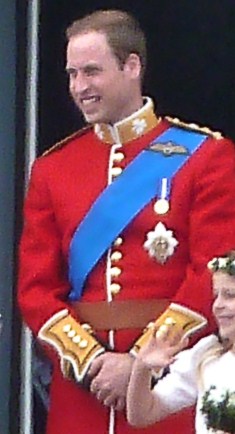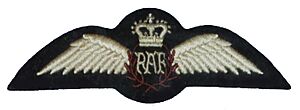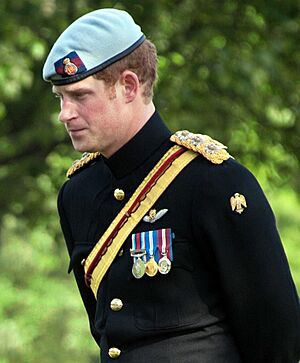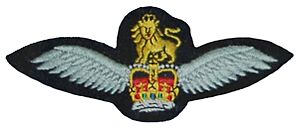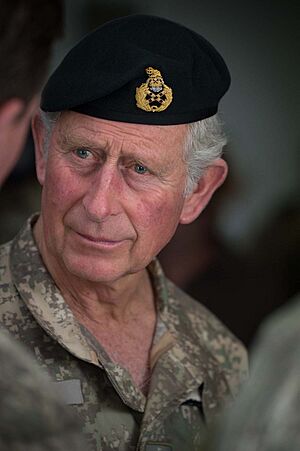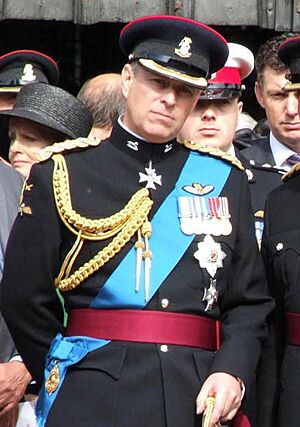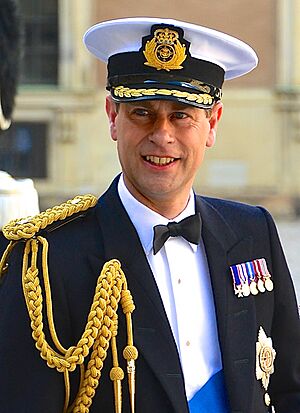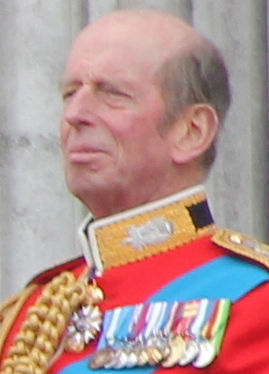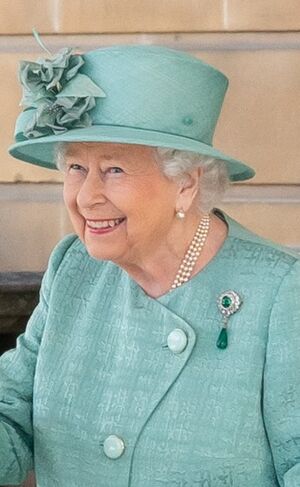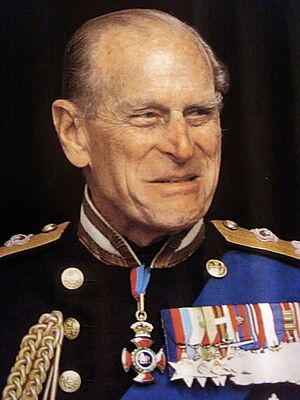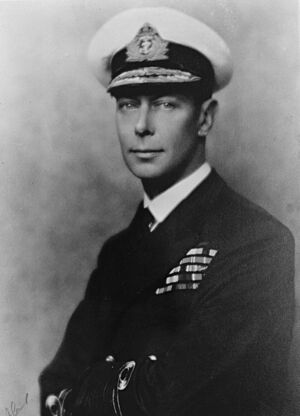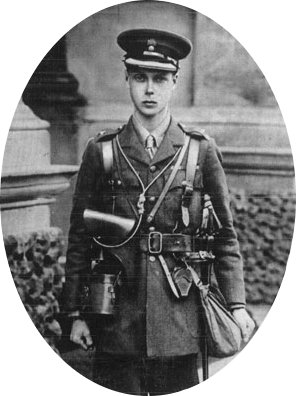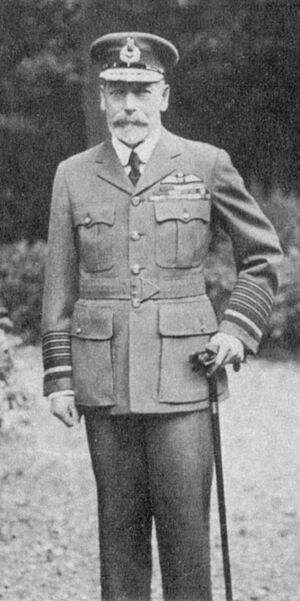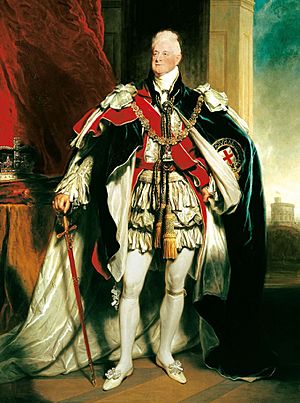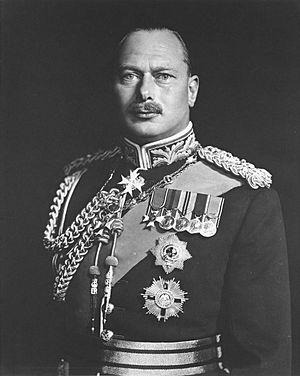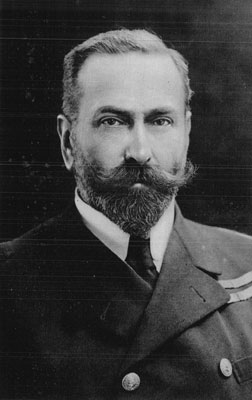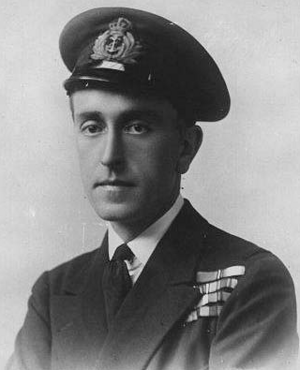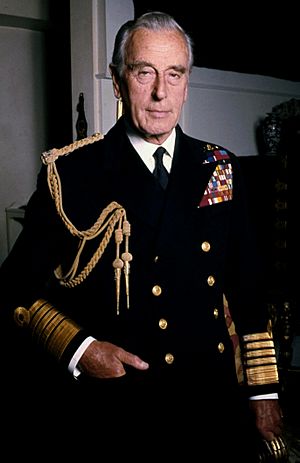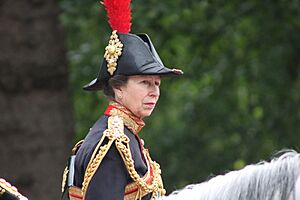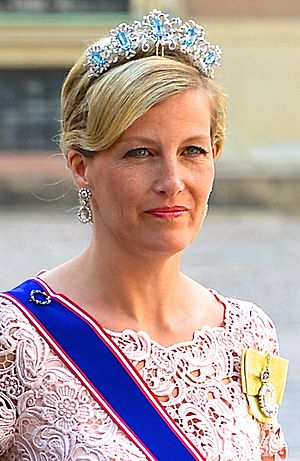Military service by British royalty facts for kids
Many members of the British royal family have served in the British armed forces, or they hold special honorary (meaning "in name only") positions. This article explains the military service of these royal family members.
Some royals hold military titles and jobs even if they haven't served in the military themselves. For example, Anne, Princess Royal has many important roles in the armed forces, but she didn't serve as a soldier.
Contents
Understanding Military Terms
To help you understand this article, here are some common abbreviations:
- RN - Royal Navy (the sea branch)
- RNR - Royal Navy Reserve (part-time Navy)
- RNVR - Royal Naval Volunteer Reserve (volunteers for the Navy)
- RM - Royal Marines (special sea soldiers)
- RAF - Royal Air Force (the air branch)
- MC - Military Cross (a medal for bravery)
Royals Who Served in the Military
This section lists members of the Royal Family who actively served in the armed forces. The "rank whilst active" shows the highest rank they held during their service. The "current rank worn" shows any higher ranks they received later, often as honorary titles. Royals often get promotions even after they leave active service.
Living Members of the Royal Family
| Name of Royal | Service Branch | Highest Active Rank | Years of Service | Current Honorary Rank | Wartime Service | Key Units | Training & Skills | Medals | Special Military Roles |
| William, Prince of Wales | RN, British Army, RAF | 2005–2013 | None | Blues and Royals, No. 22 Squadron (RAF Search and Rescue) | Royal Military Academy Sandhurst, RAF Cranwell | Commodore-in-Chief of HMNB Clyde; Colonel of the Irish Guards | |||
| Prince Harry, Duke of Sussex | British Army | 2005–2015 | Afghanistan | Blues and Royals, Army Air Corps | Royal Military Academy Sandhurst, Forward Air Controller | (Titles returned to HM King) Captain General Royal Marines | |||
| King Charles III | RN, British Army, RAF | 1971–1976 | None | 845 Naval Air Squadron | Britannia Royal Naval College, Commando Training Centre Royal Marines, Royal Air Force College, Cranwell | Field Marshal, Colonel-in-Chief, Colonel, Honorary Air Commodore | |||
| Prince Andrew, Duke of York | RN, RAF | 1980–2001 | Falklands War | 815 Naval Air Squadron | Royal Naval College, Dartmouth, Commando Training Centre Royal Marines | (Titles returned to HM King) Admiral of the Sea Cadet Corps | |||
| Prince Edward, Duke of Edinburgh | RM | 1986–1987 | See appointments | None | N/A | Commando Training Centre Royal Marines (did not finish) | Queen Elizabeth II Silver Jubilee Medal, Queen Elizabeth II Golden Jubilee Medal, Queen Elizabeth II Diamond Jubilee Medal | Royal Honorary Colonel of the Royal Wessex Yeomanry, Commodore-in-Chief of the Royal Fleet Auxiliary | |
| Prince Michael of Kent | British Army | 1963–1981 | None | 11th Hussars | Royal Military Academy Sandhurst | Queen Elizabeth II Coronation Medal, Queen Elizabeth II Silver Jubilee Medal, Queen Elizabeth II Golden Jubilee Medal, Queen Elizabeth II Diamond Jubilee Medal | Honorary Vice Admiral, Royal Naval Reserve, Colonel-in-Chief of The Essex and Kent Scottish | ||
| Prince Edward, Duke of Kent | British Army | 1955–1976 (Ret'd) | None | Royal Scots Greys | Royal Military Academy Sandhurst | King George VI Coronation Medal, Queen Elizabeth II Coronation Medal, Queen Elizabeth II Silver Jubilee Medal, Queen Elizabeth II Golden Jubilee Medal, Queen Elizabeth II Diamond Jubilee Medal | Colonel of the Scots Guards, Colonel-in-Chief of the Royal Regiment of Fusiliers | ||
| Alexander Windsor, Earl of Ulster | British Army | 1998–2008 | Major (Ret'd) | Kosovo War, Iraq War | King's Royal Hussars | Royal Military College Sandhurst | General Service Medal, NATO Medal, Iraq Medal, Queen's Golden Jubilee Medal, Queen's Diamond Jubilee Medal | None |
Deceased Members of the Royal Family
| Name of Royal | Service Branch | Highest Active Rank | Years of Service | Current Honorary Rank | Wartime Service | Key Units | Training & Skills | Medals | Special Military Roles |
| Elizabeth II of the United Kingdom† | Auxiliary Territorial Service, British Army | 1945–1949 | World War II | None | None | Ceremonial Colonel-in-Chief of Commonwealth armies | |||
| Prince Philip, Duke of Edinburgh† | RN, British Army, RAF | 1940–1952 | World War II – including Battle of Crete | British Pacific Fleet | Royal Naval College, Greenwich | Lord High Admiral of the United Kingdom, Field Marshal | |||
| George VI of the United Kingdom† | RN, RAF | 1909–1919 | (as monarch) |
World War I | HMS Collingwood | Britannia Royal Naval College | 1914 Star, British War Medal, Victory Medal | Colonel-in-Chief – Commonwealth armies | |
| Edward VIII of the United Kingdom† | British Army, RAF | 1914–1918 | N/A | World War I | Grenadier Guards | Osborne Naval College | Military Cross | Colonel-in-Chief – Commonwealth armies | |
| George V of the United Kingdom† | RN | 1877–1891 | N/A | None | HMS Bacchante | None | None | Admiral of the Fleet of the Royal Navy | |
| William IV of the United Kingdom† | RN | 1780–1789 | N/A | American War of Independence | HMS Andromeda | None | None | General of the British Army | |
| Prince Henry, Duke of Gloucester† | British Army | 1919-1937 (active) and 1940-1945 (war) | Honorary Captain of the RNVR | World War II, Battle of France | King's Royal Rifle Corps | Royal Military College Sandhurst | None | Colonel in Chief-Gloucestershire Regiment | |
| Louis Mountbatten, 1st Marquess of Milford Haven† | RN | 1868–1914 | Anglo-Egyptian War, First World War | Royal Alfred|1864|6 | None | Knight Grand Cross of the Order of the Bath | First Sea Lord | ||
| George Mountbatten, 2nd Marquess of Milford Haven† | RN | 1904–1937 | First World War | Royal Naval College, Dartmouth | None | Knight Commander of the Royal Victorian Order | |||
| Louis Mountbatten, 1st Earl Mountbatten of Burma† | RN | 1913–1965 | First World War, Second World War | Supreme Allied Commander South East Asia | Royal Naval College, Dartmouth | Knight of the Garter, Knight Grand Cross of the Order of the Bath | Chief of the Defence Staff |
Important Notes:
- The medals shown are usually those with a ribbon worn on a uniform.
- The "Highest Active Rank" is the highest rank a royal reached while actively serving. Ranks given after they left active service are in the "Current Honorary Rank" column.
- Royals can get military ranks in two main ways:
- They train as officers at places like Britannia Royal Naval College (Navy), Royal Military Academy Sandhurst (Army), or Royal Air Force College Cranwell (Air Force).
- They are given an honorary rank, which is a special title, either in addition to their active rank or instead of it if they are not serving officers.
- When royals leave active service, they are often promoted to the rank they would have reached if they had stayed in the military.
Royals with Honorary Military Roles (No Active Service)
Some royals hold special "Honorary Ranks" within the British Armed Forces, even if they haven't served themselves. These roles are mostly ceremonial. There are many such roles in other Commonwealth countries too.
These honorary roles can include:
- Royal Colonel: A special appointment made by the King or Queen for a regiment.
- Honorary Air Commodore-in-Chief and Honorary Air Commodores for the Royal Air Force.
- Honorary Commodore-in-Chief for the Royal Navy.
| Photograph | Name of Royal | Highest Honorary Rank | Naval Roles | Army Roles | Air Force Roles | Uniform Notes |
| Anne, Princess Royal | Admiral (2012), General, Air Chief Marshal | Chief Commandant for Women in the Royal Navy, Commodore-in-Chief of HMNB Portsmouth | Colonel-in-Chief of many regiments, including the Royal Corps of Signals and RLC. | Honorary Air Commodore of RAF Brize Norton. | Wears uniforms for all three services depending on the event. | |
| Sophie, Duchess of Edinburgh | None in own right (wears rank when acting in role) | None | Colonel-in-Chief of the QARANC, Royal Colonel of 5th Battalion, The Rifles. | Honorary Air Commodore, RAF Wittering. |
See also
- British royal family
- The Canadian Crown and the Canadian Armed Forces
- British Armed Forces
- United Kingdom


